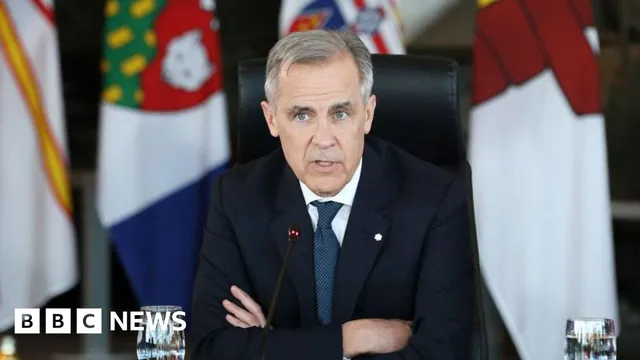
Trump persists in calling Canada the 51st state despite backlash
2025-04-28 16:55- Mark Carney confirmed that Donald Trump frequently discusses making Canada the 51st state.
- Trump's remarks have sparked a surge of nationalism among Canadians, affecting their electoral choices.
- Despite Trump's claims, Carney firmly stated that Canada will never become a U.S. state.
Express your sentiment!
Insights
In Canada, Prime Minister Mark Carney addressed ongoing discussions regarding U.S. President Donald Trump's desire to make Canada the 51st state during a call on March 28, 2025. Carney disclosed that Trump frequently raises this contentious issue, which has become increasingly significant in the context of a federal election in Canada. Trump's rhetoric about Canada's potential annexation has sparked patriotic sentiments among Canadians and heightened tensions with their government. As a result, the Liberal Party, led by Carney, has gained traction among voters who are reacting against Trump's trade war and the tariffs imposed on Canadian goods. During his presidency, Trump reiterated his ambitions not only to acquire Greenland but also to annex Canada, emphasizing that he is serious about these proposals. He mentioned that acquiring Canada would alleviate perceived strains from U.S. involvement in Canadian defense and trade relationships. Trump's comments have provoked widespread criticism across Canada, where leaders and citizens feel their sovereignty is being threatened. Amid this heated atmosphere, the Canadian election is unfolding against a backdrop of heightened nationalism propelled by concerns over Trump's repeated annexation hints. Mark Carney, after succeeding Justin Trudeau in March 2025, is navigating a complex political landscape shaped by external pressures from the U.S. Trump’s remarks during interviews and communications have dominated campaign discourse, forcing both Carney and his main opponent, Pierre Poilievre of the Conservative Party, to focus significantly on U.S.-Canada relations. While Carney has asserted unequivocally that Canada will not become a state, the election context has magnified the importance of how Canadian leaders respond to Trump’s claims and actions, impacting voter sentiments considerably. As Canadians prepare to vote, they are weighing the implications of Trump's policies and statements for their own national identity and trade relations. The ongoing trade war initiated by Trump's tariffs has only intensified Canadian nationalism, with many voters seeking a government that can effectively address the economic risks posed by U.S. policies. The current electoral situation thus reflects a critical moment for Canada, as the electorate responds to external pressures and reaffirms its national integrity amidst the bluster from the U.S. president.
Contexts
U.S.-Canada relations have a long and intricate history that is characterized by a blend of cooperation and competition, evolving through various political, economic, and social contexts. These two nations share the longest international border in the world, which has facilitated extensive trade and diplomatic interactions. Historically, the relationship can be traced back to the 18th century with early colonization efforts and the American Revolutionary War, where Canada’s allegiance to the British crown set the stage for differences that would lead to a complicated relationship. Despite this, the two countries have often found common ground, especially during significant events such as World War I and II, where they fought alongside each other, fostering a deep-seated defense collaboration that continues to this day. Over the decades, this relationship has matured, manifesting in various treaties and agreements aimed at promoting economic ties and security between the two nations. The evolution of trade agreements has played a pivotal role in shaping U.S.-Canada relations, particularly with the establishment of the Canada-U.S. Free Trade Agreement in 1989 and its subsequent expansion into the North American Free Trade Agreement (NAFTA) in 1994. These agreements dismantled trade barriers and enabled a deep integration of the two economies, spurring significant economic growth and interdependency. Currently, Canada is one of the largest trading partners of the United States, with millions of jobs in both countries linked to this trade relationship. The complexities of their trade relationship have sometimes led to disputes over tariffs and trade practices, reflecting the competitive aspects that exist alongside their cooperative history. This balance is evident in the way both nations approach issues such as natural resource management, environmental policies, and labor standards, often seeking a harmonized approach to these critical areas. In recent years, the political dynamics within each country have also influenced bilateral relations. Leadership changes and differing political agendas can strain relations, but cooperative dialogue has generally prevailed, ensuring that both countries work closely on mutual concerns such as immigration policy, border security, and climate change. Significant events, such as the COVID-19 pandemic, highlighted the need for sustained collaboration, particularly regarding public health and economic recovery measures. Furthermore, ongoing issues related to indigenous rights, human trafficking, and cybersecurity have necessitated a continued partnership in addressing cross-border challenges, reflecting modern interdependencies that characterize U.S.-Canada relations. Looking to the future, the relationship between the U.S. and Canada is likely to continue evolving as both nations confront global challenges. The effects of climate change, technological advancement, and shifting demographics will shape how these two countries interact on the international stage. Moreover, the emphasis on sustainable economic practices and renewable energy collaboration will likely become more prominent as both nations navigate environmental objectives. By embracing shared values of democracy, human rights, and security, the U.S.-Canada relationship remains one of mutual respect and aligned interests, signaling a robust foundation for future cooperation in an increasingly complex world.